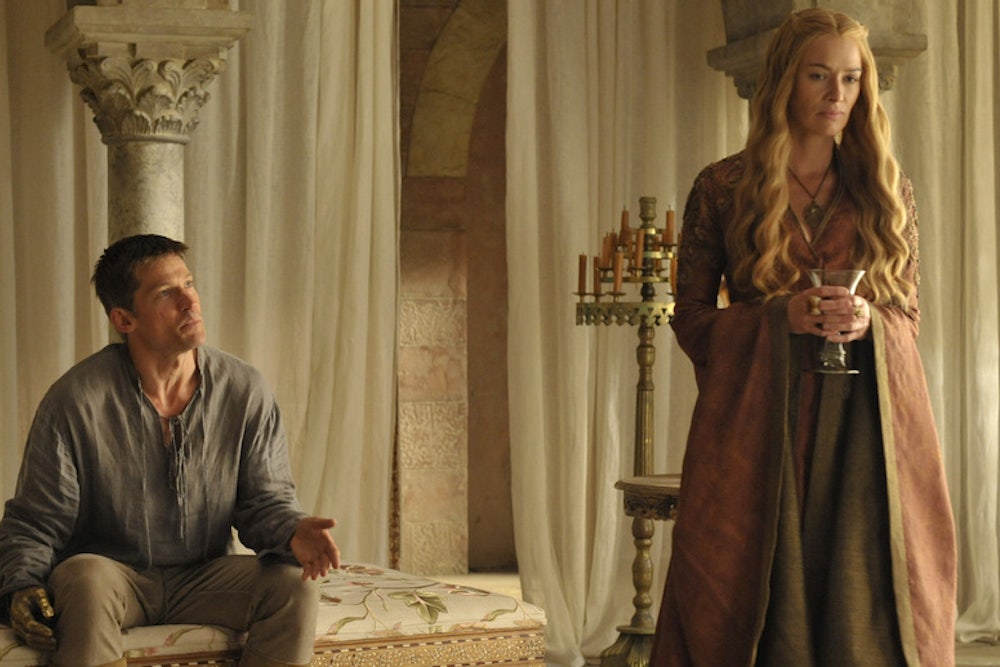Last night on Game of Thrones Jaime Lannister raped his twin sister, Cersei. This is indisputable. Watch for yourself. Cersei consistently says no to Jaime, physically fights him off, and tells him repeatedly that it’s wrong.
Of course, that’s not what Alex Graves, the director of the episode said in an interview that was partially released just as the episode ended. He said:
Well, it becomes consensual by the end, because anything for them ultimately results in a turn-on, especially a power struggle.
Graves was pilloried for the description—and rightly so. Adding to the strangeness was the fact that he’d told The Hollywood Reporter earlier that day that “Jaime comes in and he rapes her.” In that particular interview, he called the act “forced sex.” When a man calls something both a rape and a turn-on, or gives the sense that he maybe didn’t want people to construe a rape as rape, you pretty much know an Internet contretemps is about to begin.
But one aspect of the criticism strikes me as off key: The critics are also blaming Graves for ruining the Jaime character. Slate’s Amanda Marcotte said “Now he’s just a big mess that doesn’t make any sense at all, and the character’s arc may never recover.” Scott Meslow at The Week claimed that the scene “single-handedly threatens to derail the arcs of both Jaime and Cersei Lannister.” In an incredibly thoughtful essay at the A.V. Club, Sonia Saraiya slams the showrunners for assuming “that rape between characters doesn’t fundamentally change the rest of their story.”
Much of the Twittersphere seemed to share this sentiment—especially since the scene as Graves filmed it is so very, very different from the sequence as it appears in the book. There, Cersei lightly protests against the sex, but then changes her mind and ultimately appears to enjoy it.
By this point in the books—just as on the show—Jaime has undertaken a slow, gradual evolution from a brute who pushes children out of windows to a sympathetic amputee who is desperate for his family’s love and approval. In fact, Jaime is one of the few characters who, despite horrific circumstances, has continually changed for the better. Critics of last night’s episode see this rape as a violation of some implicit contract the show created with viewers to salvage Jaime from the Lannister family wreckage.
But this is ridiculous. The show is full of violence and vengeance and horrific crimes perpetrated by all manner of characters. Just a few episodes ago sweet little Arya engaged in a riotous murderfest when confronted by a man who had tortured her in the past. Daenerys, once shy and unassuming and a victim of rape herself, ordered her flame-breathing dragon to immolate the slave-driver with whom she’d just signed a contract. Cersei herself has ordered more men dead than we can count, but because she loves her children so dearly, we hold out hope that she may morph into a force for good. Yes, Arya’s was an act of vengeance. Yes, the man Dany kills is a cruel master who has insulted and demeaned her. And yes, Cersei’s murders and machinations are all a larger part of a political game. But their complexity is what keeps "Game of Thrones" from devolving into a particularly bloody fairytale. If our heroes and heroines never committed immoral acts, they wouldn’t keep our interest or their humanity.
Which is why it’s hard to embrace the argument that, only now, the showrunners have truly ruined "Game of Thrones"'s new golden boy (pun sorta intended). Is Jaime unredeemable in a way that others on the show are not? Is he worse than The Hound, who cut down a child upon instruction, but whom we now find almost charming in his protection of Arya? Is he worse than Daenerys, who uses her birthright as an excuse to march across a continent murdering anyone who steps in her way? Is he worse than Khal Drogo, who was also a rapist but whose wife came to revere him? None of them have been called irredeemable or unsalvageable or unpardonable.
Yes, fans will and should perceive Jaime differently from now on. But Jaime wasn’t all good before he raped Cersei, and he won’t be all bad now. This is television! People suspend disbelief about all kinds of things, especially involving the question of whether perpetrators of ghastly crimes can also be appealing. While I wish the show’s writers had found a different way to handle the sequence (and stayed more faithful to George R.R. Martin’s plotline), I can understand the rationale of shaking up the narrative. It’s only Season 4 (and Book 3!). There’s still a long way to go til winter.
